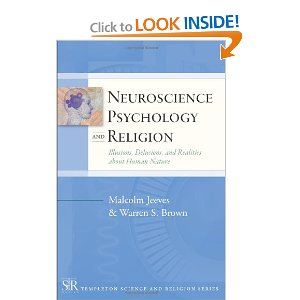
Malcolm Jeeves and Warren S. Brown
5.0 out of 5 stars Eloquently written review! Best of Class. Congratulations!
February 16, 2010
By Kenneth J. Garcia “Jazz Is …” (Baltimore, Maryland United States)
In my early 20's, circa 1973, I questioned why each culture had it's own distinct religion much like they spoke a distinct tongue? Clearly, people speaking a language addressed a universal need to communicate. Did religion address some need so fundamental to human nature that, like our different languages, groups of people, separated in time and space would evolve different religious systems independently? The 1960's saw the world grown smaller by telecommunications and jet travel, increasing awareness of the disparities in belief systems and the consequent conflicts arising therefrom, convinced me that we were entering an era in which an appreciation of our universality was critical as our capacity for self-destruction grew. The works of individuals, like Carl Jung and Joseph Campbell, began to build bridges across an enormous chasm of endless distinctions in practices and details.
A rare accomplishment, this book journeys to the heart of those questions at the level of a Scientific American article; with eloquence and an impressive scope and command of the research. It is the most balanced account of the neuroscience perspective on religion that I have had the pleasure to read. Readers seeking more imaginative interpretations of the neuroscience data, where authors find “the God Module” on fMRI or proof of God's existence in the brain's design, will be disappointed. Here, as well, there is no treatise of comparative religious mythology or proof in the validity of any particular belief system over others. Despite being written by two admittedly Catholic scholars, they are, as well, first-rate neuroscientists. The only faith peddled here is what brain science can inform us about the phenomenon of religiosity as seen on it's effect in the central nervous system and visa versa. This is a cutting edge neuroscience view of how the brain begets the mind and what is specific to a mind hooked on religion.

